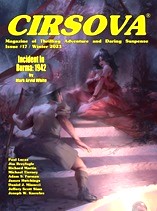“Moonlight Over Sussex” by Daniel J. Minucci
“Commander” by Richard Martin
“Ithuriel’s Spear” by Joseph W. Knowles
“Incident in Burma, 1942” by Mark Arvid White
“That Hideous Brain” by Jeffery Scott Sims
“Rising Shadows” by Adam S. Furman
“Red Queen’s Race” by Paul Lucas
“The Redemption of Alness” by Jim Breyfogle
Reviewed by Mina
In “Moonlight Over Sussex” by Daniel J. Minucci, the narrator is Nick, the “moonlight man” (magic wielder) of a heist crew. For three years, the crew successfully runs several capers. One day, Lizzie comes to tell Nick that his entire crew has been murdered, one by one, by Slaughterhouse Mickey, a zombie created and controlled by the Czar. Lizzie betrays Nick to the Czar. The reckoning happens in a boxing gym on Sussex Avenue. Will Nick’s magic be enough to save him? Urban fantasy meets 1920s gangsters and would work as a black and white B movie, with dance numbers (the zombie shuffle?).
In “Commander” by Richard Martin, Lt. Will Cushing is mourning his dead brother and setting off on a risky mission to sink an unsinkable ship. Set during the American civil war, this tale of daring-do does not feel very original but it is well written. I could imagine it working well as a comic strip.
Set some time after the American civil war, “Ithuriel’s Spear” by Joseph W. Knowles follows Marshal Clive Moultrie as he searches for a missing boy. The telegraph is down, making a strange buzzing sound. The preacher takes the marshal to talk to the boy’s mother. Her eight-year old son went missing with nary a trace when fetching water in an unusual fog, leaving just an empty bucket. A medicine man has been announcing the coming of a new world through a gateway between worlds. As clouds descend and fog rises, the marshal takes a small posse out to search for the boy, along with the preacher. He witnesses a strange event involving lights, possessed villagers and the stand made by the preacher/angel against unseen forces. Echoes of Milton and Paradise Lost hint at the avoidance of Satan escaping into the world. The reader is left to decide for themselves what exactly happened. An oddly anti-climactic tale which could be summarised in an impressionist painting.
In “Incident in Burma, 1942” by Mark Arvid White, a group of soldiers are hiding from the Japanese in a ruined temple. They are a mix of British, Indian and Burmese. During the night, they are visited by gods or djinn. In the morning, the Japanese attack and a deadly shadow comes to their aid. The historical period was interesting but I didn’t really feel the build-up in suspense the author was aiming for. The cover illustration of this issue is for this tale.
In “That Hideous Brain” by Jeffery Scott Sims, the narrator acquires rare, occult archaeological objects by means fair or foul. Hired by the arrogant Dr Derosch, who claims to have acquired psychic powers, he sets out to acquire the Eye of Xenophor from a private collector. The narrator’s secretary warns him that several rivals of the doctor have met with a nasty and lethal accident. On the advice of another expert, he decides to drop the job and return the advance payment. Derosch kidnaps his secretary to force him to cooperate. He is interrupted during the theft by the Eye’s owner, who is actually relieved to let it go. He warns the narrator that the Eye always exacts poetic justice. The ending is not really a surprise as it was hinted at right at the beginning of the tale. It could be turned into a 50s radio play with over-the-top music effects.
“Rising Shadows” by Adam S. Furman follows a demon hunter at work. Knox frees a possessed man from a demon, only to be led to a church whose leader is willingly possessed. Knox fights the demon, who has almost as many lives as a cat. The prose is clunky and the story unremarkable. It could be turned into shadow theatre.
“Red Queen’s Race” by Paul Lucas is worth the wait. It is head and shoulders above all the other tales in this issue of Cirsova. It starts with echoes of the Matrix and In Time, but it’s like jumping into the deep end and going even deeper. We follow Rab in his race to earn enough Financial Seconds to stay alive. It’s a gripping race, whilst he slowly realises that his Virtual Personal Assistant, Alice, has been making decisions without him. He finds the courage to envisage switching her off, then the Brain OS. But what will he find when he steps out of the virtual world he has spent his whole life in? It’s a wonderful allegory and begs the question—what would we find if we stopped running and simply looked at the world around us? This would make a decent episode of The Twilight Zone.
In “The Redemption of Alness” by Jim Breyfogle, Mangos and Kat have survived betrayal. They must sneak into a city to kill the leaders of the occupying force. It reads like a computer game, which lends itself to action but not depth.
 Cirsova
Cirsova